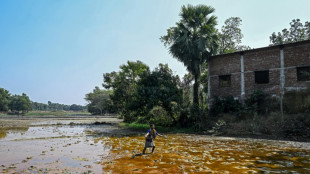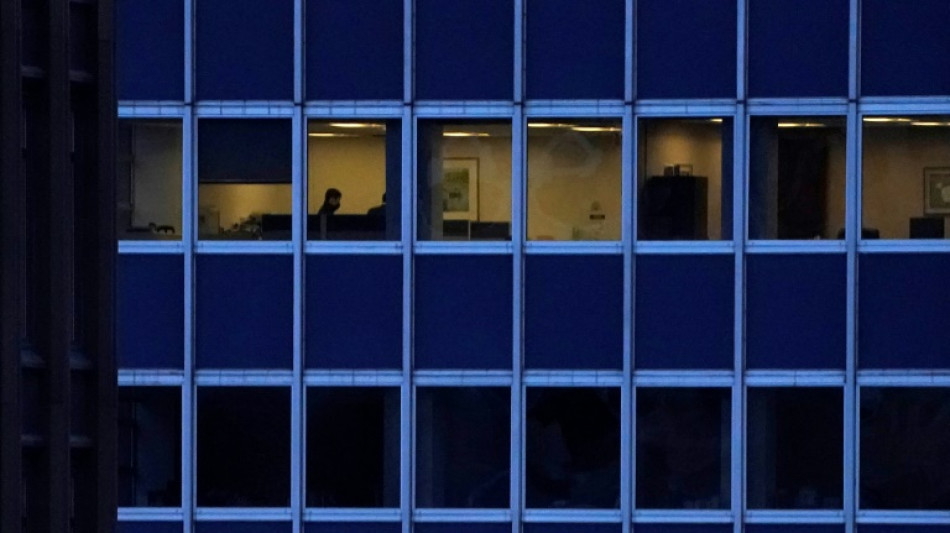
-
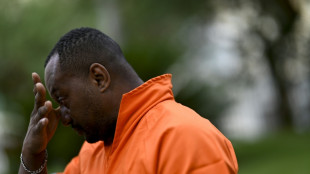 Brazil binman finds newborn baby on garbage route
Brazil binman finds newborn baby on garbage route
-
US senator smashes record with marathon anti-Trump speech
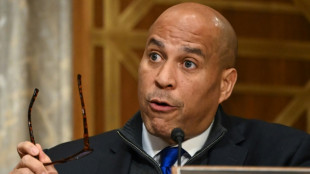
-
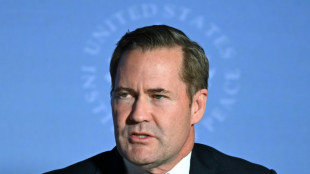 Trump advisor Waltz faces new pressure over Gmail usage
Trump advisor Waltz faces new pressure over Gmail usage
-
Niger junta frees ministers of overthrown government

-
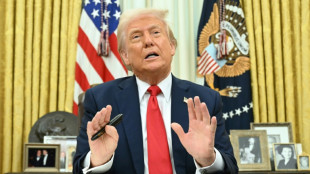 Trump set to unleash 'Liberation Day' tariffs
Trump set to unleash 'Liberation Day' tariffs
-
Boeing chief to acknowledge 'serious missteps' at US Senate hearing

-
 Real Madrid hold Real Sociedad in eight-goal thriller to reach Copa del Rey final
Real Madrid hold Real Sociedad in eight-goal thriller to reach Copa del Rey final
-
Nuno salutes 'special' Elanga after stunning strike fires Forest

-
 PSG survive scare against Dunkerque to reach French Cup final
PSG survive scare against Dunkerque to reach French Cup final
-
Sundowns edge Esperance as crowd violence mars quarter-final

-
 Nottingham Forest beat Man Utd, Saka scores on Arsenal return
Nottingham Forest beat Man Utd, Saka scores on Arsenal return
-
Elanga wonder-goal sinks Man Utd as Forest eye Champions League berth

-
 Stock markets mostly advance ahead of Trump tariffs deadline
Stock markets mostly advance ahead of Trump tariffs deadline
-
US movie theaters urge 45-day 'baseline' before films hit streaming

-
 Saka scores on return as Arsenal beat Fulham
Saka scores on return as Arsenal beat Fulham
-
Third-division Bielefeld shock holders Leverkusen in German Cup

-
 Ball-blasting 'Torpedo bats' making waves across MLB opening weekend
Ball-blasting 'Torpedo bats' making waves across MLB opening weekend
-
Newsmax shares surge more than 2,000% in days after IPO

-
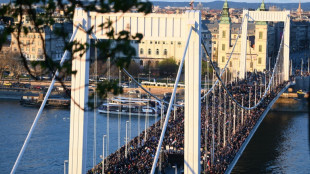 Thousands of Hungarians protest against Pride ban law
Thousands of Hungarians protest against Pride ban law
-
GM leads first quarter US auto sales as tariffs loom
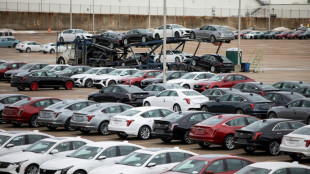
-
 Tesla sales tumble in Europe in the first quarter
Tesla sales tumble in Europe in the first quarter
-
No 'eye for an eye' approach to US tariffs: Mexico

-
 NFL club owners back dynamic kickoffs, delay tush push vote
NFL club owners back dynamic kickoffs, delay tush push vote
-
Trump 'perfecting' new tariffs as nervous world braces

-
 Trump nominee says to press UK on Israel arms
Trump nominee says to press UK on Israel arms
-
French court says Le Pen appeal ruling could come before presidential vote

-
 The battle to control assets behind Bosnia crisis
The battle to control assets behind Bosnia crisis
-
Prabhsimran powers Punjab to IPL win over Lucknow

-
 Mass layoffs targeting 10,000 jobs hit US health agencies
Mass layoffs targeting 10,000 jobs hit US health agencies
-
Tiger's April Foolishness: plan to play Masters just a joke

-
 Myanmar quake toll passes 2,700, nation halts to honour victims
Myanmar quake toll passes 2,700, nation halts to honour victims
-
Turkish fans, artists urge Muse to cancel Istanbul gig
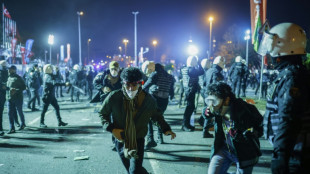
-
 US seeks death penalty for accused killer of insurance CEO
US seeks death penalty for accused killer of insurance CEO
-
UK govt moves to block sentencing guidelines for minority defendants

-
 Trump puts world on edge as 'Liberation Day' tariffs loom
Trump puts world on edge as 'Liberation Day' tariffs loom
-
Swedish journalist jailed in Turkey kept 'isolated': employer

-
 Stock markets advance ahead of Trump tariffs deadline
Stock markets advance ahead of Trump tariffs deadline
-
Gulf between Everton and Liverpool has never been bigger, says Moyes

-
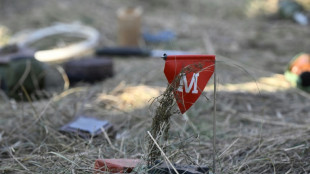 Finland to withdraw from anti-personnel mine ban treaty
Finland to withdraw from anti-personnel mine ban treaty
-
UK vows £20 million to boost drone and 'flying taxi' services
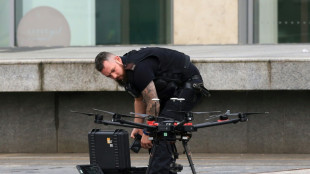
-
 Ford's US auto sales dip in first quarter as tariffs loom
Ford's US auto sales dip in first quarter as tariffs loom
-
Digging for box office gold, 'A Minecraft Movie' hits cinemas

-
 Southampton boss Juric desperate to avoid Premier League 'worst team' tag
Southampton boss Juric desperate to avoid Premier League 'worst team' tag
-
Thailand rescue dogs double as emotional support
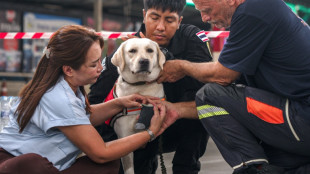
-
 Five takeaways from Marine Le Pen verdict
Five takeaways from Marine Le Pen verdict
-
Stock markets split ahead of Trump tariffs deadline

-
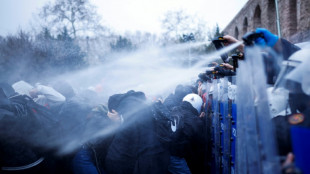 Turkish fans, artists urge Muse to cancel Istanbul gig over protest dispute
Turkish fans, artists urge Muse to cancel Istanbul gig over protest dispute
-
Former captain Edwards named new England women's cricket coach

-
 Haaland ruled out for up to seven weeks: Man City boss Guardiola
Haaland ruled out for up to seven weeks: Man City boss Guardiola
-
UK Supreme Court opens car loans hearing as banks risk huge bill
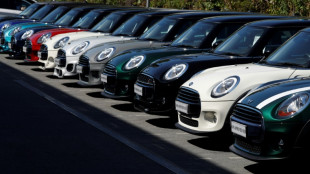

Covid air war being lost, experts warn, urging mass ventilation
The world is still not using one of its most effective weapons against Covid -- properly ventilating public spaces -- more than two years into the pandemic, experts warn.
At the moment there is a "fragile, armed peace" with Covid-19, said Antoine Flahault, director of the Institute of Global Health at the University of Geneva.
"In the hopes of stemming the tide of the pandemic and reducing mortality, we need to reduce the level of contamination, which the vaccine cannot do alone," he told AFP.
"We need a new phase -- improving the quality of indoor air."
Covid-19 is primarily transmitted through the air. It is carried in large droplets or fine aerosols when an infected person breathes -- and even more so when they talk, sing or shout.
In a closed off or poorly ventilated room, these aerosols can remain in the air for some time, moving around the space and greatly increasing the risk of infection.
While it is generally accepted that Covid can be transmitted within two metres (6.5 feet) via both droplets and aerosols, there is still no consensus on the importance of long-distance airborne transmission indoors.
A team of researchers from the UK Health Security Agency and the University of Bristol reviewed 18 studies in several countries on airborne transmission.
In research published in the BMJ this week, they found that people can infect each other when they are more than two metres apart.
- Open that window -
We know one thing for sure: if you open a window, or well-ventilate a space, the virus-carrying aerosols dissipate like smoke.
But experts say that nowhere near enough is being done to ventilate public and private spaces across the world.
"On the whole, this is an issue that governments have not yet taken up," Flahault said.
He called for massively increased funding to ventilate many public spaces, starting with schools, hospitals, public transport, offices, bars and restaurants.
"Just as we knew to filter and treat drinking water" in homes at the beginning of the 1900s, "one can imagine some households will equip themselves with air purifiers and consider opening their windows," Flahault said.
Only a few countries have announced ventilation plans since the start of the pandemic.
In March the US government called on all building owners and operators, as well as schools and universities, to "adopt key strategies to improve indoor air quality".
The plan, dubbed the Clean Air in Buildings Challenge, is covered by previously announced Covid funding and also includes a review of existing ventilation, heating and air conditioning systems.
The European Union has not issued any binding statements on improving air quality in light of Covid.
However Belgium has announced a plan to have a carbon dioxide meter situated in all places open to the public. Having such a meter is voluntary until the end of 2024, when it becomes mandatory.
Stephen Griffin of the School of Medicine at Britain's University of Leeds lamented that the UK had not acted more on ventilation.
"Sadly, the UK has not embraced the opportunity to safeguard its citizens in public spaces, its children in schools, or the longevity of the vaccination programme in this way," he told the Science Media Centre.
He said that setting minimum safety standards for ventilation in public buildings would also "greatly mitigate the impact of other diseases".
"Better ventilation also improves cognition by reducing carbon dioxide levels and, along with filtration, can reduce the impact of pollen and other allergies."
O.Johnson--AMWN

